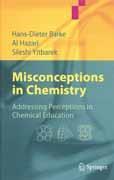Addressing perceptions in chemical education

Hans-Dieter Barke, Al Hazari and Sileshi Yitbarek
Springer
2009 | 312pp | £84.99
ISBN 9783540709886
This book is intended for chemistry teachers in training, but would be useful for teachers in service. Its content wrestles with the problem, well-known to teachers, that no matter how well you think you have taught, students produce answers and explanations which defy your best efforts. The authors have set out to address this by providing teachers with tools to diagnose and 'cure' students' preconceptions of chemical topics.
Most of the material in the book has already been published in the research literature, but the authors have gathered into one volume the main thrust of the research results. Each chapter deals with related misconceptions and then suggests practical experiments, which are designed to help students abandon their nonscientific ideas and adopt the accepted scientific explanations. In fairness, the authors quote research data which show that even their best efforts are often unsuccessful in weaning many students away from their own homespun ideas of chemical concepts. In the arts, this would be seen as successful teaching, but in the sciences this is anathema.
The authors do not always offer convincing reasons why these misconceptions occur and there is a severe lack of any theoretical framework by which a teacher could understand the nature of the problems in psychological terms and adjust their teaching accordingly. The uncomfortable nettle is not grasped which would make chemistry curriculum designers and teachers face the fact that much of what is taught may not be suitable in approach or sequencing for young people at given ages. Indeed there is no strong suggestion (as there might justifiably be) that some of the material has no place in schools at all.
Purchase Misconceptions in chemistry from Amazon.co.uk






No comments yet